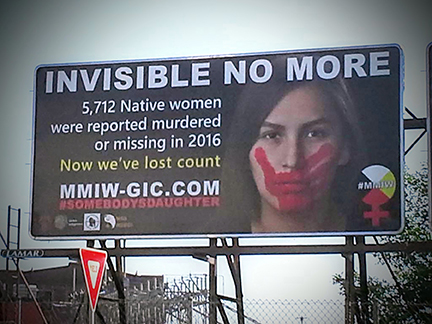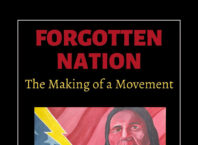
The first Murdered and Missing Indigenous Women (MMIW) billboard was placed in Duluth in August, in an effort to raise awareness and build momentum for meaningful federal legislation to impact the Murdered and Missing Indigenous Women (MMIW) tragedy arrived in Minnesota.
“It is vital to address the known ‘tracks’ of trafficked Native women and minors that lead to port cities in the Great Lakes region, such as Duluth, Minnesota, where our relatives – the victims of these heinous acts – are forced onto container ships for extended periods in both US and Canadian waters, which contributes to the cycle of trafficking on both sides of the border,” said A. Gay Kingman, Executive Director of the Great Plains Tribal Chairman’s Association (GPTCA), one of the co-hosts of the Frank LaMere Native American Presidential Forum, which was held in Sioux City, Iowa, in August.
Organized by Native Organizers Alliance and Four Directions, the MMIW epidemic was central to the forum. Four Directions Co-Executive Director, O.J. Semans, confirmed that the MMIW issue needed to be addressed by the candidates, which included Minnesota US Senator, Amy Klobuchar, Senators Elizabeth Warren and Bernie Sanders, Obama HUD Secretary, Julián Castro, author Marianne Williamson, Montana Governor Steve Bullock, former Congressman John Delaney, and independent candidate, Mark Charles, of the Navajo Nation.
The billboard campaign was conceived by the Global Indigenous Council (GIC) in association with the Rocky Mountain Tribal Leaders Council (RMTLC) and the GPTCA, tribal organizations that represent every tribe in the Rocky Mountain and Great Plains BIA regions. All are co-hosts of the Frank LaMere Native American Presidential Forum.
The billboards have appeared in states from Arizona to Montana, and now Minnesota. Duluth was chosen as the first location in Minnesota after appeals from the local community. “We are a hub for sex trafficking. Many of our native women are being murdered and/or go missing,” wrote Duluth resident, Deanna Drift.
“Duluth has long been a hub for this misery. This is not a new development; it has been happening for decades. Eleven-years ago, the Report of the Canada-United States consultation in preparation for World Congress III against sexual exploitation of children and adolescents highlighted this, and a year later the Shattered Hearts report by the Minnesota Indian Women’s Resource Center added to those findings. Over a decade later, we still await federal legislation,” said Lynnette Grey Bull, Vice President of the Global Indigenous Council.
Minnesota ranked ninth on the list of states with highest incidences of MMIW cases in last year’s Urban Indian Health Institute Report on MMIW. In the Minnesota Legislature, Rep. Mary Kunesh-Podein (D-New Brighton) has led efforts for state legislation to create an MMIW task force.
“This billboard campaign is one of the most important things that can be done for the MMIW epidemic, because without awareness there will be no change. People need to know that this has been happening for decades. This is a way to bring it to their attention,” said Senator Jon Tester (D-MT), former Chairman of the US Senate Committee on Indian Affairs. The GIC-RMTLC- GPTCA alliance worked with Senator Tester on his Studying the Missing and Murdered Indian Crisis Act.
Many of the recommendations petitioned for by the GIC-RMTLC-GPTCA alliance have received bipartisan support on Capitol Hill and are reflected in a raft of MMIW bills introduced in the 116th Congress. Congresswoman Deb Haaland (D-NM) was the first Member of Congress to endorse the MMIW billboard campaign, which is now supported by members of the US House and Senate as diverse as Congresswoman Alexandria Ocasio-Cortez (D-NY) and Senator Steve Daines (R-MT).
North Dakota’s former-Senator, Heidi Heitkamp, the original sponsor of Savanna’s Act, describes the MMIW billboard campaign as “one of the most powerful and important things” to undertake.
“As the campaign expands, we are seeing its impact. The silenced are being given a voice. As indigenous women, we are invisible no more. Today we raise awareness.
Tomorrow we will have justice,” said Grey Bull.
For more information on MMIW, see: www.mmiw-gic.com.






